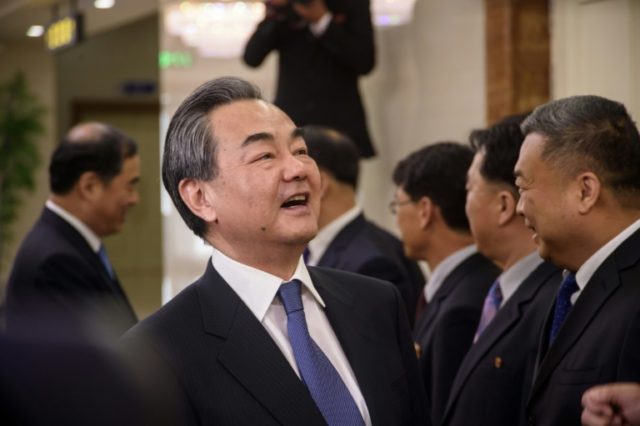Chinese Foreign Minister Wang Yi warned Americans Wednesday not to “politicize” the revelation that a U.S. diplomat had suffered a mild traumatic brain injury after hearing shrill noises in Guangzhou, China – an incident that recalled the injury of two dozen diplomats in Havana, Cuba, after hearing shrill noises.
The State Department classified the Cuba incidents as “attacks” and withdrew all non-essential staff from the communist country. In China, the U.S. State Department issued a travel alert for all Americans in the country to immediately report any unusual sounds or medical symptoms while in China.
Wang, in the United States for a brief meeting with U.S. Secretary of State Mike Pompeo, told reporters at a joint press conference that China would take all appropriate measures to get to the bottom of the incident. “Our understanding, this is an individual case of an American diplomat in Guangzhou,” he said. “China has been investigating this matter in a very responsible manner and we haven’t found that any organization or individual has carried out such a sonic influence.”
“We will stay in communication with the U.S. through diplomatic channels, and we would suggest that U.S. side can also carry out some internal investigation,” he added.
Wang then warned Americans that China does not “want to see that this individual case will be magnified, complicated, or even politicized. We hope people will not associate it with other unnecessary matters.”
“China will, in accordance with the law, protect all the lawful rights and interests of foreigners in China, especially those of diplomats. That’s our firm commitment,” he concluded.
In addition to Wang’s comments, the Chinese government responded to the American alert about the incident with a commentary posted in the state-run Global Times newspaper, which often acts as a more vitriolic mouthpiece of the Chinese government than the Foreign Ministry. According to Reuters, the Global Times complained it was “very inappropriate” for the United States to issue a travel warning.
“We firmly believe that there is not much possibility of any ‘background’ to the American consulate official’s ‘brain injury’,” it insisted.
At the joint press conference, Pompeo, who also received a question on the status of the investigation, told reporters that what had occurred was a “serious medical incident.”
“We are still trying to identify all the circumstances surrounding it,” Pompeo said. “We have notified China of what took place as best we know it, and they have responded in a way that is exactly the right response. They’ve honored their commitment under the Vienna Convention to take care of the diplomats that are serving in their country, and we truly appreciate this.”
The remark is notable, as the State Department withdrew diplomats from Havana following a similar incident suggesting that Cuba had not honored its responsibility under the Vienna Convention, the international legal document that governs how countries should treat foreign diplomats within their borders.
The U.S. Embassy in China is located in Beijing, but the incident documented reportedly occurred in the southern city of Guangzhou. According to the embassy alert, “a U.S. government employee in China recently reported subtle and vague, but abnormal, sensations of sound and pressure.”
“The clinical findings of this evaluation matched mild traumatic brain injury (MTBI),” the note from the embassy added, warning Americans that “we do not currently know what caused the reported symptoms and we are not aware of any similar situations in China, either inside or outside of the diplomatic community.” The note stated that symptoms began to surface in late 2017 and continued through April 2018. The State Department confirmed a team of U.S. medics would visit Guangzhou next week, and that China was openly encouraging cooperation between Washington and Beijing on investigating the matter.
“While in China, if you experience any unusual acute auditory or sensory phenomena accompanied by unusual sounds or piercing noises, do not attempt to locate their source,” the embassy suggested. “Instead, move to a location where the sounds are not present.”
The note added that the United States has not been able to link the incident to the attacks in Cuba, in which victims were also found to have suffered mild traumatic brain injury and several mental health symptoms.
The State Department revealed last year that 24 workers at the U.S. embassy in Cuba had experienced a variety of “concussion-like” symptoms including hearing loss, headaches, dizziness and, in some cases, depression and anxiety. A study conducted on 21 of the 24 patients found that many had suffered “widespread brain network dysfunction,” that the symptoms were the result of physical damage, and that they could not be faked for political gain given the injuries documented.
The Cuban regime denied that the attacks had occurred, referred to them as “science fiction,” and insisted in a “study” published in communist state media that the loud noises the diplomats said they heard were insect noises.

COMMENTS
Please let us know if you're having issues with commenting.